#medicar
Explore tagged Tumblr posts
Text

Health insurance is not a provider. It is a denier.
27K notes
·
View notes
Text
“It seems like almost all of those people don’t have HIV,” said Jennifer Kates, HIV policy director at KFF, a health-research nonprofit. “If they did, that would be substandard care at a pretty severe level,” she said.
Ya’ll. United Health just got accused of $17 billion in medicare fraud.
Basically they made up diagnosis which are improbable or impossible, “forgot” to remove ones which had been cured, and overall allegedly stole billions from taxpayers.
The government pays insurers a base rate for each Medicare Advantage member. The insurers are entitled to extra money when their patients are diagnosed with certain conditions that are costly to treat.
… About 18,000 Medicare Advantage recipients had insurer-driven diagnoses of HIV, the virus that causes AIDS, but weren’t receiving treatment for the virus from doctors, between 2018 and 2021, the data showed. Each HIV diagnosis generates about $3,000 a year in added payments to insurers.
… He said internal company data for 2022 showed a treatment rate for patients UnitedHealth diagnosed with HIV of more than triple what the Journal found. He said the pandemic disrupted care, lowering treatment rates during the period analyzed by the Journal, and that the analysis failed to account for patients who started treatments in future years.
The Medicare data, however, show UnitedHealth’s patients with insurer-driven HIV diagnoses were on the antiretrovirals at low rates even before the pandemic, and hardly any started the drugs in the years after UnitedHealth diagnosed them.
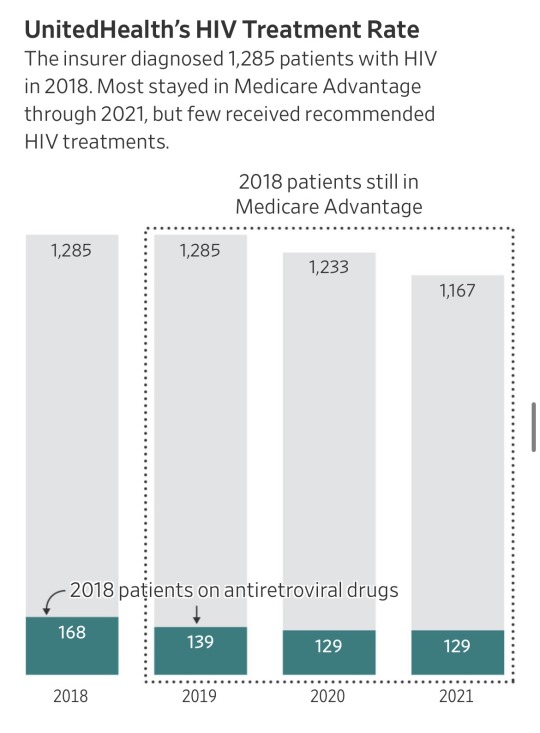
Source: https://www.wsj.com/health/healthcare/medicare-health-insurance-diagnosis-payments-b4d99a5d
I bet United Health really wishes it was a different week right now.
UPDATE/EDIT: Article is from July. I didn’t notice myself since it came up in my news feed. Don’t always trust the internet to be time accurate. 😎My guess is it is getting promoted due to current events. However, there are some updates concerning actions taken based on the report which you can look into by checking the authors’ other articles.
18K notes
·
View notes
Text

#News#brian thompson#democrats#republicans#politics#twitter#luigi mangione#medicare#universal healthcare#nhs#us
7K notes
·
View notes
Text


Healthcare is basic human rights. Healthcare should not be exclusive to only the rich.
#luigi mangione#ceo down#anti capitalism#brian thompson#basic human rights#social justice#healthcare#united healthcare ceo#ceo shooting#fuck ceos#ceo assassination#politics#usa#american#america#medicare for all#uhc#uhc ceo#uhc assassin#uhc shooter
5K notes
·
View notes
Text
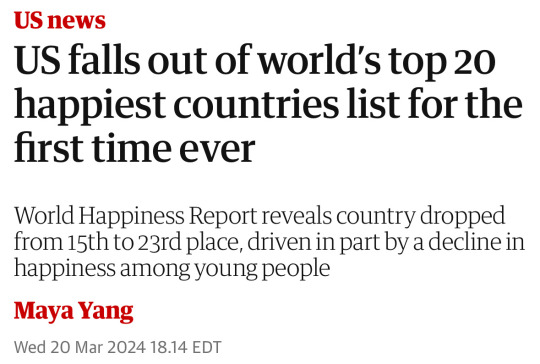
Source
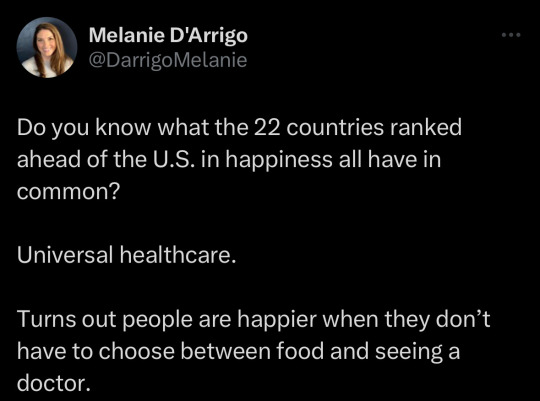
Source
#politics#us politics#government#universal healthcare#Medicare for all#news#the left#progressive#current events#twitter post#happiness#international politics#social welfare
15K notes
·
View notes
Text
the mcdonald employee that snitched:

#uhc shooter#uhc ceo#luigi mangione#brian thompson#uhc#united healthcare#ceo assassination#healthcare for all#medicare for all
3K notes
·
View notes
Text
Things the Biden-Harris Administration Did This Week #37
Oct 4-11 2024
President Biden announced a new EPA rule that will require all lead pipes in America's drinking water systems to be replace with-in 10 years. This builds on the $15 billion the Biden-Harris Administration has already invested in replacing lead pipes nation wide. The administration's focus on this issue has allowed local governments to greatly execrate their lead pipe replacement plans, before Biden took office the city of Milwaukee's timeline for replacing its lead pipes was 60 years, they're now on track to do it in 10. The EPA says there's no safe level of lead in the human body.
Vice President Harris announced she plans to expand Medicare to cover home health care. Currently those who need long term care, are covered by Medicaid, the health program for the poor so have to spend all their savings before they can qualify. This change would allow more seniors to stay in their homes and offer support to caregiving family members. Medicare also covers the disabled thus proving a game changer for the disabled Americans and their families. The Vice President also endorsed expanding Medicare to cover the costs of hearing and vision care.
Medicare released a preliminary list of 101 generic drugs which it would cover that would cost no more than $2 for a month for enrollees. People have long lobbied to allow Medicare to pay for generic drugs which has been resisted by drug companies. Thanks to President Biden's Inflation Reduction Act, and in line with a Biden Executive Order Medicare is now working on bring low cost generic drugs to seniors. The list targets some of the most common prescriptions thus will bring savings to the most people.
Domestic Policy Advisor Neera Tanden announced that the Biden-Harris Administration had blown past its goal of hiring 250,000 student support staff for 2024. The joint effort by the Department of Education, AmeriCorps and Everyone Graduates Center managed to hire 320,000 tutors, mentors, student success coaches, postsecondary transition coaches, and student support coordinators nationwide, its goal for the end of 2025.
The Department of Housing and Urban Development announced $420 million to help get rid of lead paint and other lead hazards from homes. HUD estimates that over 3 million households that have children under the age of 6 live with lead hazards. HUDs grants will go to all 50 states, DC, and Puerto Rico with particular focus on low income housing.
#Thanks Biden#Joe Biden#kamala harris#drug prices#medicare#lead#lead poisoning#students#politics#US politics#American politics
3K notes
·
View notes
Text
The governor of Pennsylvania (the state the Adjuster was found in), Josh Shapiro (who was on the shortlist to be Kamala's VP pick lol) just said at a press conference: “In America, we do not kill people in cold blood to resolve policy differences or express a viewpoint."
What, Josh, exactly, are we supposed to do?
Vote? Thanks to gerrymandering, the electoral college, politicians being funded by corporations, and "news" organizations peddling propaganda, that does shit all.
Protest? We try doing that and we are just ignored. The right makes jokes about running over protestors (because apparently only the lives of rich white people matter).
Call our politicians? They don't fucking care. We've been trying that for decades and they barely passed Obamacare, which Trump now wants to dismantle.
MLK said "a riot is the language of the unheard." We have been screaming at the tops of our lungs that these "policy differences" are killing us. Costly private medical insurance is killing us. Lack of gun control is killing us. Rising food and fuel prices are killing us. Microplastics everywhere is killing us. Fossil fuels are killing us.
And people like you, Governor Josh Shapiro, do nothing except protect your rich friends.
I'm surprised it's taken this long, and I'm surprised there haven't been copycats yet. Let me know when I should grab my torch and pitchfork, because my student and medical debt ridden ass is very ready for some good old-fashioned revolution.
#united healthcare#brian thompson#luigi mangione#medicare for all#gun control#deny defend depose#we will not grieve
2K notes
·
View notes
Text
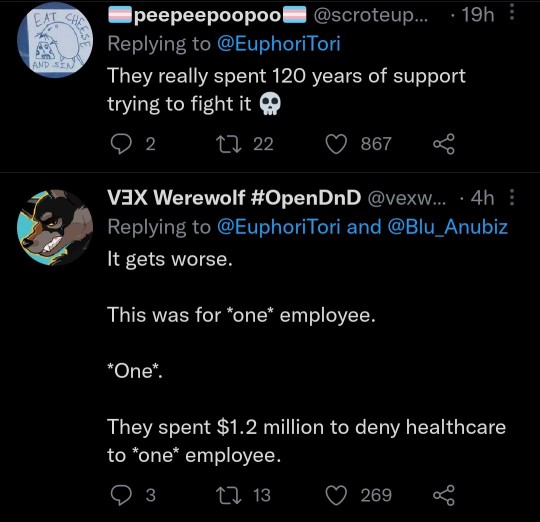
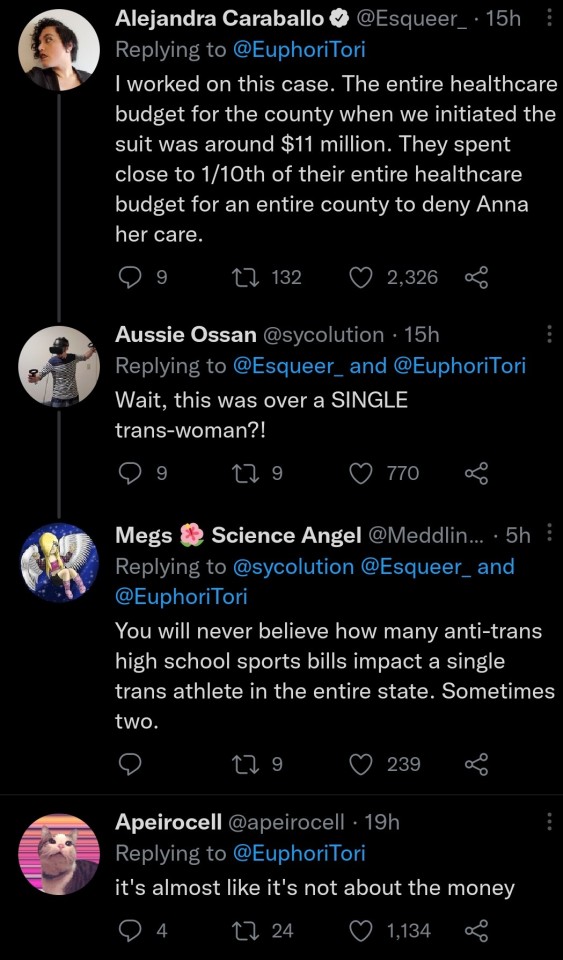

37K notes
·
View notes
Text










#brian thompson#universal human rights#universal healthcare#medicare for all or lead for some#united healthcare#meme dump
3K notes
·
View notes
Text

3K notes
·
View notes
Text

America is the only country with medical debt and medical bankruptcy.
No other country destroys your life savings via medical procedures.
No other country.
19K notes
·
View notes
Text
"The Biden administration on Thursday [August 15, 2024] released prices for the first 10 prescription drugs that were subject to landmark negotiations between drugmakers and Medicare, a milestone in a controversial process that aims to make costly medications more affordable for older Americans.
The government estimates that the new negotiated prices for the medications will lead to around $6 billion in net savings for the Medicare program in 2026 alone when they officially go into effect, or 22% net savings overall. That is based on the estimated savings the prices would have produced if they were in effect in 2023, senior administration officials told reporters Wednesday.
The Biden administration also expects the new prices to save Medicare enrollees $1.5 billion in out-of-pocket costs in 2026 alone.
“For so many people, being able to afford these drugs will mean the difference between debilitating illness and living full lives,” Chiquita Brooks-LaSure, administrator for the Centers for Medicare & Medicaid Services, told reporters. “These negotiated prices. They’re not just about costs. They are about helping to make sure that your father, your grandfather or you can live longer, healthier.”
It comes one day before the second anniversary of President Joe Biden’s signature Inflation Reduction Act, which gave Medicare the power to directly hash out drug prices with manufacturers for the first time in the federal program’s nearly 60-year history.
Here are the negotiated prices for a 30-day supply of the 10 drugs, along with their list prices based on 2023 prescription fills, according to a Biden administration fact sheet Thursday.
What Medicare and beneficiaries pay for a drug is often much less than the list price, which is what a wholesaler, distributor or other direct purchaser paid a manufacturer for a medication before any discounts...

The administration unveiled the first set of medications selected for the price talks in August 2023, kicking off a nearly yearlong negotiation period that ended at the beginning of the month.
The final prices give drugmakers, which fiercely oppose the policy, a glimpse of how much revenue they could expect to lose over the next few years. It also sets a precedent for the additional rounds of Medicare drug price negotiations, which will kick off in 2025 and beyond.
First 10 drugs subject to Medicare price negotiations
Eliquis, made by Bristol Myers Squibb, is used to prevent blood clotting to reduce the risk of stroke.
Jardiance, made by Boehringer Ingelheim and Eli Lilly, is used to lower blood sugar for people with Type 2 diabetes.
Xarelto, made by Johnson & Johnson, is used to prevent blood clotting, to reduce the risk of stroke.
Januvia, made by Merck, is used to lower blood sugar for people with Type 2 diabetes.
Farxiga, made by AstraZeneca, is used to treat Type 2 diabetes, heart failure and chronic kidney disease.
Entresto, made by Novartis, is used to treat certain types of heart failure.
Enbrel, made by Amgen, is used to treat autoimmune diseases such as rheumatoid arthritis.
Imbruvica, made by AbbVie and J&J, is used to treat different types of blood cancers.
Stelara, made by Janssen, is used to treat autoimmune diseases such as Crohn’s disease.
Fiasp and NovoLog, insulins made by Novo Nordisk.
In a statement Thursday, Biden called the new negotiated prices a “historic milestone” made possible because of the Inflation Reduction Act. He specifically touted Vice President Kamala Harris’ tiebreaking vote for the law in the Senate in 2022.
Harris, the Democratic presidential nominee, said in a statement that she was proud to cast that deciding vote, adding there is more work to be done to lower health-care costs for Americans.
“Today’s announcement will be lifechanging for so many of our loved ones across the nation, and we are not stopping here,” Harris said in a statement Thursday, noting that additional prescription drugs will be selected for future rounds of negotiations."
-via CNBC, August 15, 2024
#public health#healthcare#united states#us politics#biden#harris#kamala harris#medicare#medicaid#healthcare accessibility#prescription drugs#big pharma#insulin#good news#hope
3K notes
·
View notes
Text



#Project 2025#trump#biden#history#liberals#democrats#mga#woc#medicare#healthcare#gay marriage#blm#Muslims#Scotus#Climate change#feminism#contraception#fbi#usa#germany
5K notes
·
View notes
Text
Predicting the present

If you'd like an essay-formatted version of this post to read or share, here's a link to it on pluralistic.net, my surveillance-free, ad-free, tracker-free blog:
https://pluralistic.net/2024/12/09/radicalized/#deny-defend-depose

Back in 2018, around the time I emailed my immigration lawyer about applying for US citizenship, I started work on a short story called "Radicalized," which eventually became the title story of a collection that came out in 2019:
https://us.macmillan.com/books/9781250228598/radicalized/
"Radicalized" is a story about America, and about guns, and about health care, and about violence. I live in Burbank, which is ranks second in gun-stores-per-capita in the USA, a dubious honor that represents a kind of regulatory arbitrage with our neighboring goliath, the City of Los Angeles, where gun store licensing is extremely tight. If you're an Angeleno in search of a firearm, you're almost certainly coming to Burbank to buy it.
Walking, cycling and driving past more gun stores than I'd ever seen in my Canadian life got me thinking about Americans and guns, a subject that many Canadians have passed comment upon. Americans kill each other, and especially themselves, at rates that baffle everyone else in the world, and they do it with guns. When we moved here, my UK born-and-raised daughter came home from her first elementary school lockdown drill perplexed and worried. Knowing what I did about US gun violence, I understood that while school shootings and other spree killings happened with dismal and terrifying regularity, they only accounted for a small percentage of the gun deaths here. If you die with a bullet in you, the chances are that the finger on the trigger was your own. The next most likely suspect is someone you know. After that, a cop. Getting shot by a stranger out of uniform is something of a rarity here – albeit a spectacular one that captures our imaginations in ways that deliberate or accidental self-slayings and related-party shootings do not.
So I told her, "Look, you can basically ignore everything they tell you during those lockdown drills, because they almost certainly have nothing to do with your future. But if a friend ever says to you, 'Hey, wanna see my dad's gun?' I want you to turn around and leave and get in touch with me right away, that instant."
Guns turn the murderous impulse – which, let's be honest, we've all felt at some time or another – into a murderous act. Same goes for suicide, which explains the high levels of non-accidental self-shootings in the USA: when you've got a gun, the distance between suicidal ideation and your death is the ten feet from the sofa to the gun in the closet.
Americans get angry at people and then, if they have a gun to hand, sometimes they shoot them. In a thread /r/Burbank about how people at our local cinemas are rude and use their phones in which someone posted, "Well, you should just ask them to stop." The reply: "That's a great way to get shot." No one chimed in to say, "Don't be ridiculous, no one would shoot you for asking them to put away their phone during a movie." Same goes for "road rage."
And while Americans shoot people they've only just gotten angry at, they also sometimes plan shooting sprees and kill a bunch of people because they're just generically angry. Being angry about the state of the world is a completely relatable emotion, of course, but the targets of these shootings are arbitrary. Sure sometimes these killings have clear, bigoted targets – mass shootings at Black supermarkets or mosques or synagogues or gay bars – more often the people who get sprayed with bullets (at country and western concerts or elementary schools or movie theaters) are almost certainly not the people the gunman (almost always a man) is angry at.
This line of thought kept surfacing as I went through the immigration process, but not just when I was dealing with immigration paperwork. I was also spending an incredible amount of time dealing with our health insurer, Cigna, who kept refusing treatments my pain doctor – one of the most-cited pain researchers in the country – thought I would benefit from. I've had chronic pain since I was a teenager, and it's only ever gotten worse. I've had decades of pain care in Canada and the UK, and while the treatments never worked for very long, it was never compounded by the kinds of bureaucratic stuff I went through with my US insurer.
The multi-hour phone calls with Cigna that went nowhere would often have me seeing red – literally, a red tinge closing in around my vision – and usually my hands would be shaking by the time I got off the call.
And I had it easy! I wasn't terminally ill, and I certainly wasn't calling in on behalf of a child or a spouse or parent who was seriously ill or dying, whose care was being denied by their insurer. Bernie's 2016 Medicare For All campaign promise had filled the air with statistics (Americans pay more for care and get worse outcomes than anyone else in the rich world), and stories. So many stories – stories that just tore your heart out, about parents who literally had to watch their children die because the insurance they paid for refused to treat their kids. As a dad, I literally couldn't imagine how I'd cope in that situation. Just thinking about it filled me with rage.
One day, as I was swimming in the community pool across the street – a critical part of my pain management strategy – I was struck with a thought: "Why don't these people murder health insurance executives?" Not that I wanted them to. I don't want anyone to kill anyone. But why do American men who murder their wives and the people who cut them off in traffic and random classrooms full of children leave the health insurance industry alone? This is an industry that is practically designed to fill the people who interact with it with uncontrollable rage. I mean, if you're watching your wife or your kid die before your eyes because some millionaire CEO decided to aim for a $10 billion stock buyback this year instead of his customary $9 billion target, wouldn't you feel that kind of murderous rage?
Around this time, my parents came out for a visit from Canada. It was a great trip, until one night, my mom woke me up after midnight: "We have to take your father to the ER. He's really sick." He was: shaking, nauseated, feverish. We raced down the street to the local hospital, part of a gigantic chain that has swallowed nearly all the doctors' practices, labs and hospitals within an hour's drive of here.
Dad had kidney stones, and they'd gone septic. When the ER docs removed the stones, all the septic gunk in his kidneys was flushed into his bloodstream, and he crashed. If he hadn't been in an ER recovery room at the time, he would have died. As it was, he was in a coma for three days and it was touch and go. My brother flew down from Toronto, not sure if this was his last chance to see our dad alive. The nurses and doctors took great care of my dad, though, and three days later, he emerged from his coma, and today, he's better than ever.
But on day two, when we thought he was probably at the end of his life, as my mother sat at his side, holding the hand of her husband of fifty years, someone from the hospital billing department came to her side and said, "Mrs Doctorow, I know this is a difficult time, but I'd like to discuss the matter of your husband's bill with you."
The bill was $176,000. Thankfully, the travel medical insurance plan offered by the Ontario Teachers' Union pension covered it all (I don't suppose anyone gets very angry with them).
How do people tolerate this? Again, not in the sense of "people should commit violent acts in the face of these provocations," but rather, "How is it that in a country filled with both assault rifles and unimaginable acts of murderous cruelty committed by fantastically wealthy corporations, people don't leap from their murderous impulses to their murderous weapons to commit murderous acts?
For me, writing fiction is an accretive process. I can tell that a story is brewing when thoughts start rattling around in my mind, resurfacing at odd times. I think of them as stray atoms, seeking molecules with available docking sites to glom onto. I process all my emotions – but especially my negative ones – through this process, by writing stories and novels. I could tell that something was cooking, but it was missing an ingredient.
Then I found it: an interview with the woman who coined the term "incel." It was on the Reply All podcast, and Alana, a queer Canadian woman explained that she had struggled all her life to find romantic and sexual partnership, and jokingly started referring to herself as "involuntarily celibate," and then, as an "incel":
https://gimletmedia.com/shows/reply-all/76h59o
Alana started a message board where other "incels" could offer each other support, and it was remarkably successful. The incels on Alana's message board helped each other work through the problems that stood between them and love, and when they did, they drifted away from the board to pursue a happier life.
That was the problem, Alana explained. If you're in a support group for people with a drinking problem, the group elders, the ones who've been around forever, are the people who've figured it out and gotten sober. When life seems impossible, those elders step in to tell you, I know it's terrible right now, but it'll get better. I was where you are and I got through it. You will, too. I'm here for you. We all are.
But on Alana's incel board, the old timers were the people who couldn't figure it out. They were the ones for whom mutual support and advice didn't help them figure out what they needed to do in order to find the love they sought. The longer the message board ran, the more it became dominated by people who were convinced that it was hopeless, that love was impossible for the likes of them. When newbies posted in rage and despair, these Great Old Ones were there to feed it: You're right. It will never get better. It only gets worse. There is no hope.
That was the missing piece. My short story Radicalized was born. It's a story about men on a message board called Fuck Cancer Right In the Fucking Face (FCKRFF, or "Fuckriff"), who are watching the people they love the most in the world be murdered by their insurance companies, who egg each other on to spectacular acts of mass violence against health insurance company employees, hospital billing offices, and other targets of their rage. As of today, anyone can read this story for free, courtesy of my publishers at Macmillan, who gave permission for the good folks at The American Prospect to post it:
https://prospect.org/culture/books/2024-12-09-radicalized-cory-doctorow-story-health-care/
I often hear from people about this story, even before an unknown (at the time of writing) man assassinated Brian Thompson, CEO of Unitedhealthcare, the murderous health insurance monopoly that is the largest medical insurer in the USA. Since then, hundreds of people have gotten in touch with me to ask me how I feel about this turn of events, how it feels to have "predicted" this.
I've been thinking about it for a few days now, and I gotta tell you, I have complicated feelings.
You've doubtless seen the outpourings of sarcastic graveyard humor about Thompson's murder. People hate Unitedhealthcare, for good reason, because he personally decided – or approved – countless policies that killed people by cheating them until they died.
Nurses and doctors hate Thompson and United. United kills people, for money. During the most acute phase of the pandemic, the company charged the US government $11,000 for each $8 covid test:
https://pluralistic.net/2020/09/06/137300-pct-markup/#137300-pct-markup
UHC leads the nation in claims denials, with a denial rate of 32% (!!). If you want to understand how the US can spend 20% of its GDP and get the worst health outcomes in the world, just connect the dots between those two facts: the largest health insurer in human history charges the government a 183,300% markup on covid tests and also denies a third of its claims.
UHC is a vertically integrated, murdering health profiteer. They bought Optum, the largest pharmacy benefit manager ("A spreadsheet with political power" -Matt Stoller) in the country. Then they starved Optum of IT investment in order to give more money to their shareholders. Then Optum was hacked by ransomware gang and no one could get their prescriptions for weeks. This killed people:
https://www.economicliberties.us/press-release/malicious-threat-actor-accesses-unitedhealth-groups-monopolistic-data-exchange-harming-patients-and-pharmacists/#
The irony is, Optum is terrible even when it's not hacked. The purpose of Optum is to make you pay more for pharmaceuticals. If that's more than you can afford, you die. Optum – that is, UHC – kills people:
https://pluralistic.net/2024/09/23/shield-of-boringness/#some-men-rob-you-with-a-fountain-pen
Optum isn't the only murderous UHC division. Take Navihealth, an algorithm that United uses to kick people out of their hospital beds even if they're so frail, sick or injured they can't stand or walk. Doctors and nurses routinely watch their gravely ill patients get thrown out of their hospitals. Many die. UHC kills them, for money:
https://prospect.org/health/2024-08-16-steward-bankruptcy-physicians-private-equity/
The patients murdered by Navihealth are on Medicare Advantage. Medicare is the public health care system the USA extends to old people. Medicare Advantage is a privatized system you can swap your Medicare coverage for, and UHC leads the country in Medicare Advantage, blitzing seniors with deceptive ads that trick them into signing up for UHC Medicare Advantage. Seniors who do this lose access to their doctors and specialists, have to pay hundreds or thousands of dollars for their medication, and get hit with $400 surprise bills to use the "free" ambulance service:
https://prospect.org/health/2024-12-05-manhattan-medicare-murder-mystery/
No wonder the public spends 22% more subsidizing Medicare Advantage than they spend on the care for seniors who stick with actual Medicare:
https://theconversation.com/taxpayers-spend-22-more-per-patient-to-support-medicare-advantage-the-private-alternative-to-medicare-that-promised-to-cost-less-241997
It's not just the elderly, it's also the addicted and mentally ill. UHC illegally denies coverage for mental health and substance abuse treatment. Imagine watching a family member spiral out of control, ODing, or ending up on the streets with hallucinations, and knowing that the health insurance company that takes thousands of dollars out of your paycheck refused to treat them:
https://www.startribune.com/unitedhealthcare-will-pay-15-7m-in-settlement-of-denial-of-care-charges/600087607
Unsurprising, the internal culture at UHC is callous beyond belief. How could it not be? How could you go to work at UHC and know you were killing people and not dehumanize those victims? A lawsuit by chronically ill patient whom UHC had denied care for surfaced recorded phone calls in which UHC employees laughed long and hard about the denied claims, dismissing the patient's desperate, tearful pleas as "tantrums" :
https://www.propublica.org/article/unitedhealth-healthcare-insurance-denial-ulcerative-colitis
Those UHC workers are just trying to get by, of course, and the callouses they develop so they can bear to go to work were ripped off by last week's murder. UHC's executive team knows this, and has gone on a rampage to stop employees from leaking their own horror stories, or even mentioning that the internal company announcement of Thompson's death was seen by 16,000 employees, of whom only 28 left a comment:
https://www.kenklippenstein.com/p/unitedhealthcare-tells-employees
Doctors and nurses hate UHC on behalf of their patients, but it's also personal. UHC screws doctor's practices by refusing to pay them, making them chase payments for months or even years, and then it offers them a payday lending service that helps them keep the lights on while they wait to get paid:
https://www.youtube.com/watch?v=frr4wuvAB6U
Is it any surprise that Reddit's nursing forums are full of nurses making grim, satisfied jokes about the assassination of the $10m/year CEO who ran the $400b/year corporation that does all this?
https://www.thedailybeast.com/leading-medical-subreddit-deletes-thread-on-unitedhealthcare-ceos-murder-after-users-slam-his-record/
We're not supposed to experience – much less express – schadenfreude when someone is murdered in the street, no matter who they are. We're meant to express horror at the idea of political violence, even when that violence only claims a single life, a fraction of the body count UCH produced under Thompson's direction. As Malcolm Harris put it, "'Every life is precious' stuff about a healthcare CEO whose company is noted for denying coverage is pretty silly":
https://twitter.com/BigMeanInternet/status/1864471932386623753
As Woody Guthrie wrote, "Some will rob you with a six-gun/And some with a fountain pen." The weapon is lethal when it's a pistol and when it's an insurance company. The insurance company merely serves as an accountability sink, a layer of indirection that lets a murder happen without any person being the technical murderer:
https://profilebooks.com/work/the-unaccountability-machine/
I don't want people to kill insurance executives, and I don't want insurance executives to kill people. But I am unsurprised that this happened. Indeed, I'm surprised that it took so long. It should not be controversial to note that if you run an institution that makes people furious, they will eventually become furious with you. This is the entire pitch of Thomas Piketty's Capital in the 21st Century: that wealth concentration leads to corruption, which is destabilizing, and in the long run it's cheaper to run a fair society than it is to pay for the guards you'll need to keep the guillotines off your lawn:
https://memex.craphound.com/2014/06/24/thomas-pikettys-capital-in-the-21st-century/
But we've spent the past 40 years running in the other direction, maximizing monopolies, inequality and corruption, and gaslighting the public when they insist that this is monstrous and unfair. Back in 2022, when UHC was buying Change Healthcare – the dominant payment network for hospitals, which would allow UHC to surveil all its competitors' payments – the DOJ sued to block the merger. The Trump-appointed judge in the case, Carl Nichols – who owned tens of thousands of dollars in UHC bonds – ruled against the DOJ, saying that it would all be fine thanks to United's "culture of trust and integrity":
https://www.thebignewsletter.com/p/the-antitrust-shooting-war-has-started
We don't know much about Thompson's killer yet, but he's already becoming a folk hero, with lookalike contests in NYC:
https://twitter.com/CollinRugg/status/1865472577478553976
And gigantic graffiti murals praising him and reproducing the words he wrote on the shell casings of the bullets he used to kill Thompson, "delay, deny, depose":
https://www.tumblr.com/radicalgraff/769193188403675136/killin-fuckin-ceos-freight-graff-in-the-bay
I get why this is distasteful. Thompson is said to have been a "family man" who loved his kids, and I have no reason to disbelieve this. I can only imagine that his wife and kids are shattered by this. Every living person is the apex of a massive project involving dozens, hundreds of people who personally worked to raise, nurture and love them. I wrote about this in my novel Walkaway, as the characters consider whether to execute a mercenary sent to kill them, whom they have taken hostage:
She had parents. People who loved her. Every human was a hyper-dense node of intense emotional and material investment. Speaking meant someone had spent thousands of hours cooing to you. Those lean muscles, the ringing tone of command — their inputs were from all over the world, carefully administered. The merc was more than a person: like a spaceship launch, her existence implied thousands of skilled people, generations of experts, wars, treaties, scholarship and supply-chain management. Every one of them was all that.
But so often, the formula for "folk hero" is "killing + time." The person who terrorizes the people who terrorize you is your hero, and eventually we sanitize the deaths, and just remember them as fighters for justice. If you doubt it, consider the legend of Robin Hood:
https://twitter.com/mcmansionhell/status/1865554985842352501
The health industry is trying to put a lid on this, palpably afraid that – as in my story "Radicalized" – this one murderer will become a folk hero who inspires others to acts of spectacular violence. They're insisting that it's unseemly to gloat about Thompson's death. They're right, but this is an obvious loser strategy. The health industry is full of people whose deaths would be deplorable, but not unsurprising. As Clarence Darrow had it:
I’ve never wished a man dead, but I have read some obituaries with great pleasure.
Murder is never the answer. Murder is not a healthy response to corruption. But it is healthy for people to fear that if they kill people for greed, they will be unsafe. On December 5 – the day after Thompson's killing – the health insurer Anthem announced that it would not pay for anesthesia for medical procedures that ran long. The next day, they retracted the policy, citing "outrage":
https://www.cnn.com/2024/12/05/health/anthem-blue-cross-blue-shield-anesthesia-claim-limits/index.html
Sure, maybe it was their fear of reputation damage that got them to decide to reverse this inhumane, disgusting, murderous policy. But maybe it was also someone in the C-suite thinking about what share of the profits from this policy would have to be spent on additional bodyguards for every Anthem exec if it went into effect, and decided that it was a money-loser after all.
Think about hospital exec Ralph de la Torre, who cheerfully testified to Congress that he'd killed patients in pursuit of profit. De la Torre clearly doesn't fear any kind of consequences for his actions. He owns hospitals that are filled with tens of thousands of bats (he stiffed the exterminators), where none of the elevators work (he stiffed the repair techs), where there's no medicine or blood (he stiffed the suppliers) and where the doctors and nurses can't make rent (he stiffed them too). De La Torre doesn't just own hospitals – he also owns a pair of superyachts:
https://pluralistic.net/2024/02/28/5000-bats/#charnel-house
It is a miracle that so many people have lost their mothers, sons, wives and husbands so Ralph de la Torre could buy himself another superyacht, and that those people live in a country where you can buy an assault rifle, and that Ralph de la Torre isn't forced to live in a bunker and travel in a tank.
It's a rather beautiful sort of miracle, to be honest. I like to think that it comes from a widespread belief by the people of this country I have since become a citizen of, that we should solve our problems politically, rather than with bullets.
But the assassination of Brian Thompson is a wake-up call, a warning that if we don't solve this problem politically, we may not have a choice about whether it's solved with violence. As a character in "Radicalized" says, "They say violence never solves anything, but to quote The Onion: that's only true so long as you ignore all of human history":
https://prospect.org/culture/books/2024-12-09-radicalized-cory-doctorow-story-health-care/
#pluralistic#unitedhealthcare#assassination#execution#violence#murder#science fiction#radicalized#health insurance#m4a#medicare for all#Brian Thompson#guns#cancer#corruption#usausausa#torment nexus
1K notes
·
View notes
